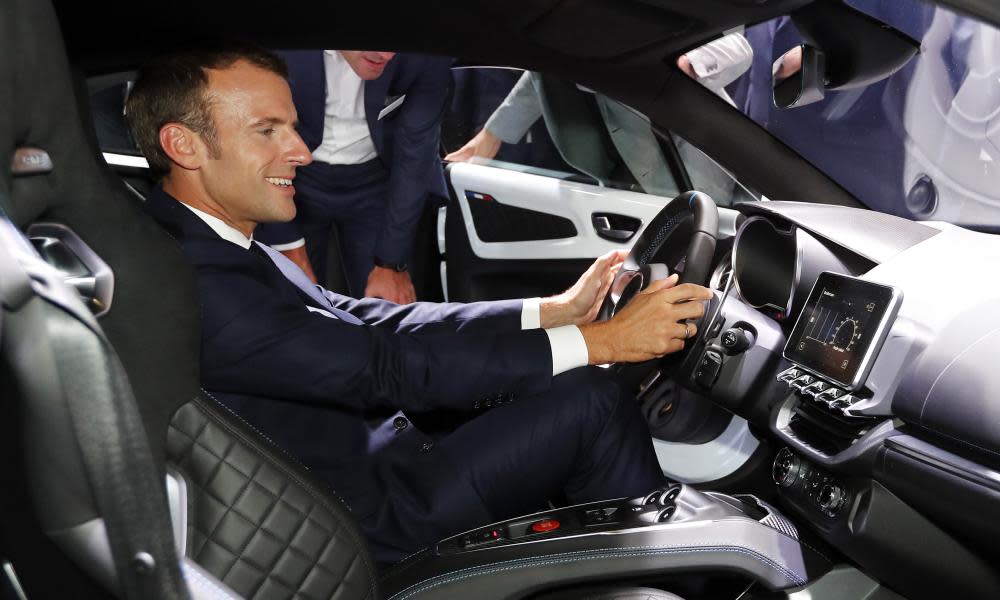Macron makes overtures to UK car firms as Brexit talks enter critical week

President Macron has stepped up attempts to attract UK-based carmakers to France with a private dinner at the Elysée Palace, following their growing concerns about a botched Brexit deal.
The heads of Renault Nissan, Vauxhall and Jaguar Land Rover are understood to have been among executives invited to a dinner last week, where the president warned against growing nationalism around the world and said he was making France more business friendly. It is the latest sign Macron is trying to attract firms nervous about the uncertainty created by Brexit. Three French ministers also took part in the dinner, with the organisers ensuring that companies with major UK operations were represented.
Macron’s charm offensive emerges before a crucial fortnight that could make or break Theresa May’s hopes of securing a comprehensive Brexit deal. Some ministers are still understood to be considering resigning should May concede further ground to Brussels, such as limiting Britain’s ability to strike trade deals with other countries.
A week of frenzied diplomatic activity will see the prime minister’s key Brexit adviser, Olly Robbins, head to Brussels on Monday, with the Brexit secretary, Dominic Raab, holding talks there on Thursday. An impasse over how to keep the Irish border open after Brexit remains, with much riding on whether May can give ground while retaining the support of Northern Irish DUP MPs.
Jean-Claude Juncker, the president of the European Commission, talked up the chances of a deal on Saturday, saying he had “reason to think the rapprochement potential between both sides has increased in recent days”. However, the EU is expected to unveil its vision for a future agreement with the UK on Wednesday that falls short of May’s demand for “frictionless trade” – a major blow to UK exporters, who have warned any disruption will hit the productivity of their UK plants.
Macron’s administration has been attempting to lure financial services staff and companies based in London for some time. Industry insiders said his dinner for car executives, held to coincide with the Paris motor show, was an attempt to make the case for France as a manufacturing location as companies decide where to build a new generation of electric cars.
At the event last week, Macron pledged to work with industry bosses to find a compromise on plans for CO2 targets and is said to have told his audience that France is now a place that champions business success. The Elysée Palace refused to comment.
Carmakers have been increasingly vocal about their Brexit concerns. Vauxhall warned last week that there would be “dramatic consequences” for its UK plants if no Brexit deal was reached. Ralf Speth, the chief executive of Jaguar Land Rover, warned last month that he was not certain whether its UK plants could continue to operate after Brexit. He has also said investment decisions over its electric car production have been delayed as a result of Brexit uncertainty.
It is now less than two weeks until the EU summit at which the principles of a deal need to be agreed. The so-called “Irish backstop” – a legal agreement guaranteeing the Irish border remains unchanged after Brexit, even if a future trade deal fails to ensure it – remains the sticking point.
In an attempt to solve the issue, Britain is expected to support sticking to the EU’s customs rules on goods, as well as aligning Northern Ireland with EU regulations, as long as the Irish assembly agrees. The bid could be derailed if it is opposed by DUP leader Arlene Foster, who has warned Northern Ireland must not be treated differently to the rest of the UK.
One EU official said: “We heard Arlene Foster’s ‘blood red’ red-line. I seem to remember the DUP said last year they were ready for a staring match, as they had cut off their eye-lids. That is a bit of a worry.”
Any suggestion the EU has a veto over Britain’s ability to move away from its customs rules in the future would be met with fierce opposition from Tory Brexiters. The mood among some ministers is grim, but most agree a “no deal” outcome would be so disastrous that there is no choice but to compromise in the short term.
An EU ambassadors meeting on Friday afternoon and addressed by Sabine Weyand, the EU’s deputy chief negotiator, heard that progress was being made, with deals on the future of UK bases in Cyprus and the future of Gibraltar close to being finalised. The Irish question remains unresolved, but EU sources were told there was “movement” on the issue.

 Yahoo News
Yahoo News 
